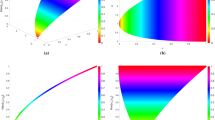Abstract
This paper presents extensive experiments on a hybrid optimization algorithm (DEPSO) we recently developed by combining the advantages of two powerful population-based metaheuristics—differential evolution (DE) and particle swarm optimization (PSO). The hybrid optimizer achieves on-the-fly adaptation of evolution methods for individuals in a statistical learning way. Two primary parameters for the novel algorithm including its learning period and population size are empirically analyzed. The dynamics of the hybrid optimizer is revealed by tracking and analyzing the relative success ratio of PSO versus DE in the optimization of several typical problems. The comparison between the proposed DEPSO and its competitors involved in our previous research is enriched by using multiple rotated functions. Benchmark tests involving scalability test validate that the DEPSO is competent for the global optimization of numerical functions due to its high optimization quality and wide applicability.
Similar content being viewed by others
References
Chen J, Xin B, Peng Z H, et al. Statistical learning makes the hybridization of particle swarm and differential evolution more efficient-a novel hybrid optimizer. Sci China Ser F-Inf Sci, 2009, 52: 1278–1282
Clerc M, Kennedy J. The particle swarm: explosion, stability and convergence in a multi-dimensional complex space. IEEE Trans Evol Comput, 2002, 6: 58–73
Price K, Storn R M, Lampinen J A. Differential Evolution: a Practical Approach to Global Optimization (Natural Computing Series). New York: Springer, 2005
Kennedy J, Mendes R. Population structure and particle swarm performance. In: Proceedings of the World Congress on Computational Intelligence, Honolulu, HI, USA, 2002. 1671–1676
Ratnaweera A, Halgamuge S K, Watson H C. Self-organizing hierarchical particle swarm optimizer with time-varying acceleration coefficients. IEEE Trans Evol Comput, 2004, 8: 240–255
Hsieh S T, Sun T Y, Liu C C, et al. Efficient population utilization strategy for particle swarm optimizer. IEEE Trans Syst Man Cybern - Part B: Cybern, 2009, 39: 444–456
Janson S, Middendorf M. A hierarchical particle swarm optimizer and its adaptive variant. IEEE Trans Syst Man Cybern-Part B: Cybern, 2005, 35: 1272–1282
Liang J J, Qin A K, Suganthan P N, et al. Comprehensive learning particle swarm optimizer for global optimization of multimodal funcions. IEEE Trans Evol Comput, 2006, 10: 281–295
Mendes R, Kennedy J. The fully informed particle swarm: simpler, maybe better. IEEE Trans Evol Comput, 2004, 8: 204–210
Bergh F van den, Engelbrecht A P. A cooperative approach to particle swarm optimization. IEEE Trans Evol Comput, 2004, 8: 225–239
Liang J J, Suganthan P N. Dynamic multi-swarm particle swarm optimizer. In: Proceedings of the IEEE Swarm Intelligence Symposium, Pasadena, California, USA, 2005. 124–129
Zhang W J, Xie X F. DEPSO: hybrid particle swarm with differential evolution operator. In: Proceedings of the IEEE International Conference on System, Man, Cybernetics, Washington, DC, USA, 2003. 3816–3821
Juang C F. A hybrid of genetic algorithm and particle swarm optimization for recurrent network design. IEEE Trans Syst Man Cybern - Part B: Cybern, 2004. 34: 997–1006
Chakraborty U K. Advances in Differential Evolution. Berlin: Springer-Verlag, 2008
Chen J, Xin B, Peng Z H, et al. Optimal contraction theorem for exploration-exploitation tradeoff in search and optimization. IEEE Trans Syst Man Cybern-Part A: Syst & Human, 2009, 39: 680–691
Eiben A E, Hinterding R, Michalewicz Z. Parameter control in evolutionary algorithms. IEEE Trans Evol Comput, 1999, 3: 124–141
Sutton A M, Whitley D, Lunacek M, Howe A. PSO and multi-funnel landscapes: how cooperation might limit exploration. In: Proceedings of the Annual Conference on Genetic and Evolutionary Computation, Seattle, Washington, USA, 2006. 75–82
Salomon R. Re-evaluating genetic algorithm performance under coordinate rotation of benchmark functions: a survey of some theoretical and practical aspects of genetic algorithms. BioSystems, 1996, 39: 263–278
Liang J J, Suganthan P N, Deb K. Novel composition functions for numerical global optimization. In: Proceedings of the IEEE Swarm Intelligence Symposium, Pasadena, California, USA, 2005. 68–75
Brest J, Greiner S, Bošković B, et al. Self-adapting control parameters in differential evolution: a comparative study on numerical benchmark problems. IEEE Trans Evol Comput, 2006, 10: 646–657
Author information
Authors and Affiliations
Corresponding authors
Rights and permissions
About this article
Cite this article
Xin, B., Chen, J., Peng, Z. et al. An adaptive hybrid optimizer based on particle swarm and differential evolution for global optimization. Sci. China Inf. Sci. 53, 980–989 (2010). https://doi.org/10.1007/s11432-010-0114-9
Received:
Accepted:
Published:
Issue Date:
DOI: https://doi.org/10.1007/s11432-010-0114-9




